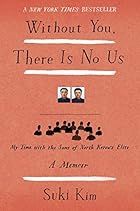Book Review: Without You, There Is No Us by Suki Kim
(Note: I received a free copy of this book in exchange for an honest review.)
Suki Kim was given an extraordinary opportunity for someone with a South Korean and American upbringing: she spent four or five months teaching English at a university in North Korea, where her students were the children of the country's elite. The university was run by Christian missionaries, and was apparently permitted because it was providing English education free of charge, though the teachers were not allowed to talk about religion with the students. Kim herself was not religious at all, but basically went as an undercover journalist, secretly taking notes for use in the writing of this book.
I've read other books about North Korea, and this isn't the best one; I'd recommend Nothing to Envy or Escape from Camp 14 as a starting point instead. But Kim's book stands out in the access that she had to the country's elite youth, and in the potential impact that she could have made. Although her job was to teach English, using pre-approved textbooks and with all of her lesson plans subjected to scrutiny, she also wanted to gradually make her students aware of what they were missing in their very limited existence, cut off from all access to the outside world. She made sure that her MacBook and Kindle were frequently visible, and impressed students with her ability to find answers to questions on the internet, which they themselves were not permitted to use. She taught them to write argumentative essays, backing up their reasoning with evidence, a completely foreign concept in a world build around unthinking acceptance of official accounts. She came to love her students, and found them gradually opening up to her.
But Kim generally comes off as frustrated with her limited progress, not appreciating the time required to come to terms with a completely different worldview. When her students constantly lie to cover for each other's absences, in a world where disobedience could mean death, she wonders whether they just don't have a sense of right or wrong. When she pushes too hard in presenting new ways of thinking, leading the students to take refuge in their familiar nationalist stories about how North Korea is the best place in the world, she laments that "nothing could break through their belligerent isolation". Yet I thought that the students showed a remarkable interest in learning about the world, considering all the constraints placed on their thought and expression throughout their lives. They don't suddenly turn into Westerners, but Kim recounts plenty of telling incidents that reveal a steadily increasing awareness.
I feel like the real problem with this book is that it stopped too soon. So much time had to be spent gaining the trust and respect of the students, and gradually opening them up to the possibility of new ideas, but Kim left after less than six months to return to North America, and didn't really have time to reap the fruits of her labour. I understand that North Korea is a brutal place to live in many ways, both because of the lack of freedom and constant surveillance, and because of the lack of basic comforts like reliable electricity and heat, and Kim constantly reports that she found it depressing and difficult to tolerate. Still, I can't help feeling that in some ways this was a wasted opportunity, and I wonder how much more of a difference she could have made--not just to her students, but to the country and even the world--if she had stayed there for a whole year, steadily building on the foundation that she had laid. She says in the acknowledgements that she had to publish this book, to tell the truth about North Korea, because she cares deeply about the country and feels an obligation to improve the lives of North Koreans. But I don't really see how this book, for outsiders, will have a deep impact, certainly not compared to the impact of daily interaction with the country's future elites at a time when they are still open to new possibilities. This is still an interesting memoir, but I personally felt like it ended almost before it had begun. I would have liked to see more about what the future held for these students with their increasing awareness that life could be different.

Wow, D. This got excellent marks at GoodReads. 4.33 STARS from 72 GoodReaders.
ReplyDeleteOn LibraryThing, too: an extremely high 4.34, even if there are only 19 ratings so far.
ReplyDelete